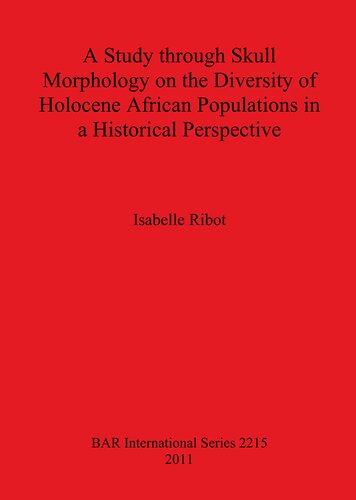

Most ebook files are in PDF format, so you can easily read them using various software such as Foxit Reader or directly on the Google Chrome browser.
Some ebook files are released by publishers in other formats such as .awz, .mobi, .epub, .fb2, etc. You may need to install specific software to read these formats on mobile/PC, such as Calibre.
Please read the tutorial at this link: https://ebookbell.com/faq
We offer FREE conversion to the popular formats you request; however, this may take some time. Therefore, right after payment, please email us, and we will try to provide the service as quickly as possible.
For some exceptional file formats or broken links (if any), please refrain from opening any disputes. Instead, email us first, and we will try to assist within a maximum of 6 hours.
EbookBell Team

5.0
60 reviewsThe main objective of the present research is to explore through skull morphology some potential sources of biological diversity within sub-Saharan Africa, such as: geography and especially history, in relation to large-scale population movements (expansion of Bantu-speakers). Therefore, through various statistical analyses, morphological variation was re-evaluated within modern sub-Saharan African populations, using a very large modern human sample and a set of metric variables related to the cranium and mandible. In the same way, morphological patterns through time were also traced, focusing on various Later Stone Age and Iron Age populations, originating in particular from strategic areas of various influences. In Chapter 2 after having briefly introduced both geographical and historical backgrounds of sub-Saharan Africa, the dispersal of Bantu-speakers, a very long-term and large-scale phenomenon, which initiated since the Early Iron Age (c. 1,000 BC) is presented in more depth. In Chapter 3, after a detailed presentation of the populations and variables under study, a preliminary analysis of inter- and intra-observer errors is presented. In chapter 4, various factors (geography, sex and ecology) are tested as a source of modern diversity. Chapter 5 looks a the effects of historical factors on skull morphology through both modern and past African diversity. Following the conclusion the author presents an extensive assemblage of Appendices (sites and datasets).